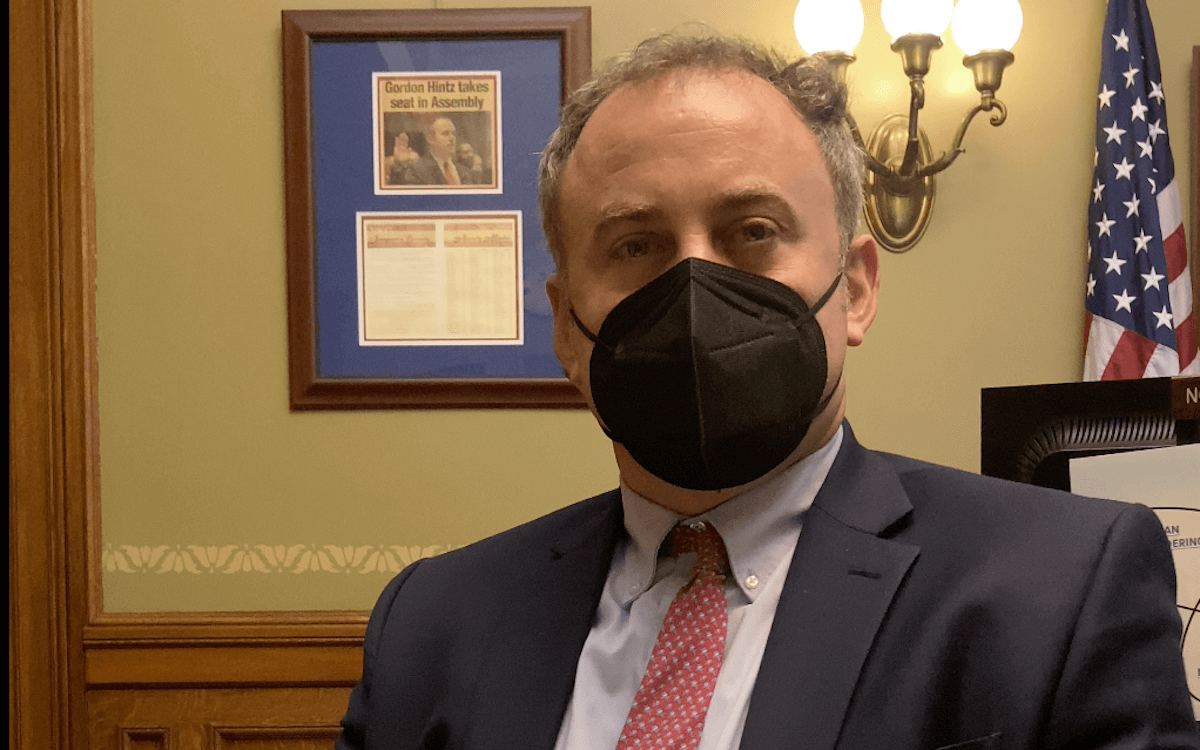
#image_title
As he prepares to step down as Assembly Democrats’ leader, Hintz talks about the state’s challenges and reflects on his time in charge.
It’s been a rough four years to lead Wisconsin’s Assembly Democrats.
The last time Minority Leader Gordon Hintz (D-Oshkosh) decided to run for his position, the pandemic had just started, and Hintz knew he would lead the party through a two-year budget and a redistricting process, all while working with a majority party that isn’t exactly open to compromise.
Last week, he announced he would forgo another bid party leadership; saying hehe wants to spend more time in his district and his family. He is still debating whether he will run for re-election to be a rank-and-file representative.
UpNorthNews spoke with Hintz to look back on 2021 and his tenure as minority leader, and ahead at what the next year could hold in store for the state.
Challenges Ahead
Hintz said his biggest concern looking forward is the misinformation campaign around the 2020 election and “the seeds that are being planted right in front of our eyes to undermine our democracy and to justify giving the Legislature the authority to administer elections and to overturn the results and determine who the electors are.”
“The 2024 election is something that really keeps me up at night,” Hintz said.
RELATED: ‘Despicable’ — Republican State Senator Calls out GOP for Election Fraud Lies
Another challenge is raising awareness about state issues, particularly as local newsrooms shrink and reduce their Capitol coverage, which results in voters choosing state lawmakers based on national politics and not the sort of things the Legislature can do to impact their daily lives
“We have Democrats running for state Assembly that are getting attacked because of [US House Speaker] Nancy Pelosi or AOC [US Rep. Alexandria Ocasio-Cortez (D-New York)], not because of their defense of schools,” Hintz said.
Another challenge is getting their message out to an increasingly polarized electorate. A recent Politico report found that many supporters of former President Donald Trump in Wisconsin acknowledged that the infrastructure package President Joe Biden signed will benefit their communities, but they still did not plan to vote for Democrats based on culture war issues, such as critical race theory and LGBTQ rights.
Hintz maintains that improving communication and continuing to work on kitchen-table issues will eventually win out.
“The president and the governor, quite frankly, deliver,” Hintz said. “And I think what the Republicans are selling on culture wars may fan the flames, but at the end of the day, aren’t what impact people.”
‘Getting Things Done’
Despite the challenges, Hintz said he feels Democrats can still get things done in the GOP-dominated Assembly and hold Republicans accountable.
“Having been in the minority for a little while now, you have to try to get the caucus to focus on what we’re trying to accomplish here. What does an effective minority look like?” Hintz said. “It’s easy to get distracted and spend hours on the floor, yelling or complaining. But I’m a big believer in getting things done when we can, trying to highlight things that need to be fixed and, if we can, make those changes. And obviously holding Republicans accountable to the voters, for things that are done that are contrary to the best interest of the state.”
He credits that approach with the election of Gov. Tony Evers in 2018 and Democrats’ ability to pick up two new seats in the Milwaukee suburbs.
“I think we’ve been able to become more effective and get more members to understand that, when we stay together, understanding our goal and our focus, we’re better,” Hintz said.
But in one of the caucus’s biggest challenges of this past year, that unity seemingly fell apart. For months, Democrats backed the People’s Maps Commission, founded by Evers to draft alternative redistricting maps. Optimistically, the maps could have been taken up on the statehouse floor but, more realistically, they would’ve been used as a counterexample to Republicans’ heavily gerrymandered maps in court. .
But when the maps were brought to the Assembly floor, many Democrats, including Hintz, voted against them, citing concerns that they would reduce minority representation. Hintz said that the maps were put on the agenda by Assembly Republicans in bad faith.
“I’m not going to debate a bill that Republicans are going to bring up only [to] vote against. To me, that’s not a serious attempt. That’s a gimmick,” Hintz said. “Every single Democrat in the Assembly supports both fair maps from a process standpoint and fair maps from a competitive standpoint—meaning, maps that are drawn to make sure that we have as many competitive districts as possible, which is really, I think, what people want.”
With Hintz stepping down from the top Democratic post, he is passing the torch. Rep. Greta Neubauer (D-Racine) was elected Monday to be the chamber’s next Minority Leader. She’ll take over the post on Jan. 10.
“As our next Leader, [Neubauer] will bring fresh energy, policy experience, unmatched organizing skill, and a clear vision for the Assembly Democratic Caucus,” Hintz stated in a press release. “I am confident Assembly Democrats will remain strong and continue to be united in pushing back against increasing Republican extremism and attacks on our democracy while also offering a positive Democratic vision for Wisconsin.”

Opinion: Many to thank in fair maps victory for Wisconsinites
On February 19, 2024, Governor Tony Evers signed into law new and fair state legislative maps, bringing hope for an end to over a decade of...

Opinion: Empowering educators: A call for negotiation rights in Wisconsin
This week marks “Public Schools Week,” highlighting the dedication of teachers, paras, custodians, secretaries and others who collaborate with...

Op-ed: Trump’s journey from hosting The Apprentice to being the biggest loser
Leading up to the 2016 election, Donald Trump crafted an image of himself as a successful businessman and a winner. But in reality, Trump has a long...

Not just abortion: IVF ruling next phase in the right’s war on reproductive freedom
Nearly two years after the US Supreme Court overturned Roe v. Wade, another court is using that ruling to go after one of the anti-abortion right’s...




